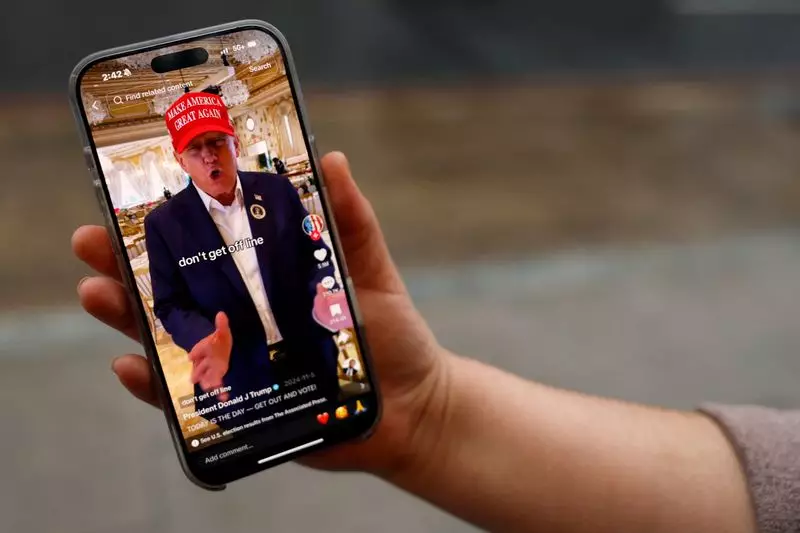TikTok, the social media phenomenon that has captivated millions, finds itself in a precarious position at the intersection of politics, security, and user engagement. Recent developments hint at a potential restoration of its service in the U.S., largely attributed to President-elect Donald Trump’s intervention. This scenario raises critical questions about the app’s future, the implications for U.S.-China relations, and the overall impact on American users and businesses.
As of Sunday, TikTok announced its plan to restore service following Trump’s promise to reconsider the app’s ban. This shift indicates a notable change in Trump’s approach compared to his initial term when he sought to ban the platform over national security concerns. Trump claimed his administration would extend the time frame for the law prohibiting the app’s use, effectively allowing a window for negotiation. By framing the issue in a manner that presents TikTok as a tool for supporting American interests, Trump demonstrates a balancing act between enforcing national security and appealing to the app’s substantial user base— especially among younger voters.
The president’s message applauding TikTok for its contribution to small businesses highlights an emerging narrative: TikTok may not only serve entertainment purposes but could also play a critical role in economic growth. Over seven million small businesses utilize the platform, driving digital entrepreneurship. By promoting TikTok’s reinstatement, Trump aligns his political motives with economic interests, amplifying the app’s significance in the national dialogue.
While TikTok celebrates its potential return to the American digital landscape, the app remains mired in broader geopolitical tensions. The concerns surrounding the users’ data being accessible by the Chinese government weigh heavily on discussions about its future. Historically, data security has been a crucial issue, with U.S. officials warning of potential risks associated with TikTok’s parent company, ByteDance. Despite Trump’s reassurances, many legislators have voiced their skepticism and maintained that an actual sale of the app’s U.S. operations is necessary to mitigate risks.
The contrasting stances within Trump’s Republican Party reveal a fracture between those who wish to save the app in its current form and hardliners insisting on a complete severance from its Chinese roots. This internal conflict inevitably complicates any resolution and highlights the intricate relationship between technology, economy, and national security.
As TikTok’s future hangs in balance, rival social media platforms like Meta and Snap have experienced rising share prices, indicating investor confidence in a potential influx of TikTok users. The looming uncertainty surrounding TikTok has led to a scramble among its user base, primarily younger individuals, seeking alternatives. This trend not only underscores the app’s popularity but also signals a critical juncture that could redefine the digital landscape if TikTok is indeed sidelined.
Furthermore, TikTok’s momentary disappearance from app stores sparked heightened interest in VPNs as users sought to retain access. This spike reflects not only the deep cultural integration of TikTok into the daily fabric of users’ lives but also the collective anxiety about losing such a significant communication and entertainment tool.
Amid these developments, the role of policy and regulatory frameworks becomes paramount. The U.S. has authorized robust measures to address the influence of foreign-owned technologies, sending a clear message that extensive efforts will be applied to ensure national security. However, this could lead to unintended consequences; by restricting access to platforms like TikTok, the U.S. may inadvertently stifle the digital marketplace and innovation, contradicting its broader economic interests.
The future of TikTok in the U.S. hinges not only on individual political maneuvers but also on strategic decisions made by ByteDance and its ability to negotiate with American stakeholders. The potential for a sale or a radical restructuring will require a delicate balancing act that satisfies both governmental requirements and user expectations.
The ongoing saga surrounding TikTok encapsulates a broader narrative of technology, politics, and economic ambitions. As Donald Trump’s administration hints at a revival for the platform, the implications extend far beyond the app itself. They touch upon national security, international relations, and the future of the digital marketplace in an ever-evolving landscape. As users cling to hope for the app’s revival, the stakes remain high for America’s economy, young entrepreneurs, and overarching security policies. The TikTok narrative serves as a reminder of the interconnectedness of modern technology and the multifaceted implications that any decision may unleash on the global stage.

